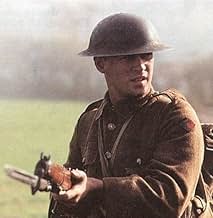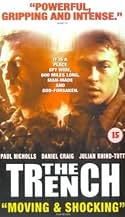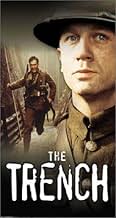IMDb RATING
5.9/10
4.6K
YOUR RATING
June 1916. The British Army is planning a big offensive in the Somme region in France. We follow a platoon of British soldiers as they sit in a forward trench, anxiously awaiting the order t... Read allJune 1916. The British Army is planning a big offensive in the Somme region in France. We follow a platoon of British soldiers as they sit in a forward trench, anxiously awaiting the order to go over the top.June 1916. The British Army is planning a big offensive in the Somme region in France. We follow a platoon of British soldiers as they sit in a forward trench, anxiously awaiting the order to go over the top.
- Awards
- 2 wins & 2 nominations total
Antony Strachan
- Pte. Horace Beckwith
- (as Anthony Strachan)
- Director
- Writer
- All cast & crew
- Production, box office & more at IMDbPro
Featured reviews
I am confident that I have never before started a review by complimenting the set designers. Comparing the vintage still photos of soldiers in World War I trenches shown at the beginning of the movie to the trenches in film itself, you can see that somebody with an eye for detail recreated the look of the trench and the costume designers did a good job with the men's uniforms. The bad news is that that is one of this movie's few strong points. For example, the view of no man's land (NML) - the ground between the opposing trenches - shows a green field. It should look like a brown, pock-marked wasteland, which has been captured in many other WW I movies.
The whole effect of "The Trench" is that of a filmed stage play. It could easily be transferred to the stage without losing much and maybe even gaining something. That is to say, the movie is not opened up much. Still, as a WW I buff, I enjoyed it.
The actors are good, and the outline of the story is illustrative of typical situations in the war. However, the specific dialogue might be a little too 1999 rather than 1916. The film does remind us that wars are fought by men who are still boys and concerned about the things young men are obsessed by.
One general situation that jumps out is the promise to the men that they would go into the enemy trenches after bombardment and after previous waves of a British attack and would not encounter any living enemy. (Mopping up, as my WW-II-veteran father called it.) But this was a typical false promise of the strategy used by both sides because the defenders would always cover themselves adequately so a majority would survive the bombardment, and they would almost always be able to get reinforcements into the trenches faster than attackers could make it across NML, and the preliminary bombardment would 1) warn the defenders an attack was coming and 2) chew up the ground making it harder for the attackers to cross, including merely rearranging the barbed wire instead of cutting through it. The result was that being the defender was always advantageous, and being the attacker was always disadvantageous in trench warfare. That's why most of the battle lines on the Western Front remained static for about four years.
I would recommend this movie as worth seeing for world war buffs and Daniel Craig fans, although it likely won't be anyone's favorite movie.
The whole effect of "The Trench" is that of a filmed stage play. It could easily be transferred to the stage without losing much and maybe even gaining something. That is to say, the movie is not opened up much. Still, as a WW I buff, I enjoyed it.
The actors are good, and the outline of the story is illustrative of typical situations in the war. However, the specific dialogue might be a little too 1999 rather than 1916. The film does remind us that wars are fought by men who are still boys and concerned about the things young men are obsessed by.
One general situation that jumps out is the promise to the men that they would go into the enemy trenches after bombardment and after previous waves of a British attack and would not encounter any living enemy. (Mopping up, as my WW-II-veteran father called it.) But this was a typical false promise of the strategy used by both sides because the defenders would always cover themselves adequately so a majority would survive the bombardment, and they would almost always be able to get reinforcements into the trenches faster than attackers could make it across NML, and the preliminary bombardment would 1) warn the defenders an attack was coming and 2) chew up the ground making it harder for the attackers to cross, including merely rearranging the barbed wire instead of cutting through it. The result was that being the defender was always advantageous, and being the attacker was always disadvantageous in trench warfare. That's why most of the battle lines on the Western Front remained static for about four years.
I would recommend this movie as worth seeing for world war buffs and Daniel Craig fans, although it likely won't be anyone's favorite movie.
This movie is an unusual type of war movie. 99% of the movie is shot inside of this 8 foot wide, 600 mile long trench, filled with British soldiers just only becoming men. It has a sense of claustistiphobia, and itensity among young men that are practically scared to death about the world around them, and every little thing counts. This movie was very intense, and you couldn't take your eyes off it for a moment. 8.8 out of 10.
"The trench" is a missed opportunity.Life in the trenches in WW1,as depicted by the many letters the soldiers sent to their families,was really a living Hell,so it was possible to make a fantasy and horror movie from this subject.That's what Abel Gance did with his masterpiece "J'accuse" (1918 and 1938) when he showed the victims rise from the dead.
"The trench" succeeds in recreating a gloomy nightmarish blue-green atmosphere ,but is short on screenplay.The story is never really interesting and there is worse: the director is incapable of creating characters we could care for,which is a shame,when it deals with martyrs of WW1 .
"The trench" succeeds in recreating a gloomy nightmarish blue-green atmosphere ,but is short on screenplay.The story is never really interesting and there is worse: the director is incapable of creating characters we could care for,which is a shame,when it deals with martyrs of WW1 .
I went considerably out of my way to be the only woman in the theater to see "The Trench" from Britain, a conventional continuation of the British obsession with World War I as being the most symbolic war. Not much new here that wasn't in "All Quiet on the Western Front" or "Paths of Glory" or "Gallipoli", but I suppose some lessons need illustrating for new generations.
Taking place claustrophobically in the trenches just prior to the bloody Battle of the Somme with the sounds of war all around--though it could also have been taking place in the canals of Mars against aliens-- the characters are typically class-based Brits (from ineffectual aristocratic officer to working class blokes whose conversations need subtitles for American viewers), but manage to stay above stereotypes through excellent acting (with actors familiar to us from PBS's "Mystery" and "Masterpiece Theater") and personalization.
I'm probably the only one other than Daniel Craig's family (and the webmasters at his fan site) who went to see the movie for him, but his career soldier sergeant in particular is a real human being.
Otherwise, as always with ensemble war movies, I have trouble telling the young guys in uniform apart to keep the characters straight.(originally written 12/2/2000)
Taking place claustrophobically in the trenches just prior to the bloody Battle of the Somme with the sounds of war all around--though it could also have been taking place in the canals of Mars against aliens-- the characters are typically class-based Brits (from ineffectual aristocratic officer to working class blokes whose conversations need subtitles for American viewers), but manage to stay above stereotypes through excellent acting (with actors familiar to us from PBS's "Mystery" and "Masterpiece Theater") and personalization.
I'm probably the only one other than Daniel Craig's family (and the webmasters at his fan site) who went to see the movie for him, but his career soldier sergeant in particular is a real human being.
Otherwise, as always with ensemble war movies, I have trouble telling the young guys in uniform apart to keep the characters straight.(originally written 12/2/2000)
Who would choose to make their debut a WWI character piece set within the confines of one trench? For his first directorial effort William Boyd has not tried to run before he can walk, and Paul Nicholls in his first released feature plays a role he clearly empathises with.
The relative inexperience of Boyd is evident in the modesty of the production - no expensive effects, no epic locations - but that actually works well in this study of young men trying to cope with the unthinkable horror that characterised the World War One battlefield.
Cooped up for days in dreadful conditions, the various characters - the naive (Nicholls), the intellectual (D'Arcy), the objectionable (Dyer), the loveable fattie (Strachan) - at turns argue with and provide support for each other, but at the end of the day have to face almost certain death on their own and in their own way.
This is not a great film, it doesn't quite provide a strong enough focus to help you empathise with the characters, for the most part it feels like a filmed play, but as a film it is able to provide moments of real visual power such as the final scenes as the boys finally leave the trenches to face the German guns.
For those last few minutes, the realisation of what they are about to do hits you hard, you can really sense the terror that they must have felt.
Despite it's "theatrical" feel at times, and the constraints of its setting, this is a fine and evocative film, with an excellent cast. Paul Nicholls, Danny Dyer and James D'Arcy are not alone in giving faultless performances, but the star of the film must be Daniel Craig, who is superb as Sgt Winter, a man who has survived the battlefield once, but knows his luck is about to run out.
The relative inexperience of Boyd is evident in the modesty of the production - no expensive effects, no epic locations - but that actually works well in this study of young men trying to cope with the unthinkable horror that characterised the World War One battlefield.
Cooped up for days in dreadful conditions, the various characters - the naive (Nicholls), the intellectual (D'Arcy), the objectionable (Dyer), the loveable fattie (Strachan) - at turns argue with and provide support for each other, but at the end of the day have to face almost certain death on their own and in their own way.
This is not a great film, it doesn't quite provide a strong enough focus to help you empathise with the characters, for the most part it feels like a filmed play, but as a film it is able to provide moments of real visual power such as the final scenes as the boys finally leave the trenches to face the German guns.
For those last few minutes, the realisation of what they are about to do hits you hard, you can really sense the terror that they must have felt.
Despite it's "theatrical" feel at times, and the constraints of its setting, this is a fine and evocative film, with an excellent cast. Paul Nicholls, Danny Dyer and James D'Arcy are not alone in giving faultless performances, but the star of the film must be Daniel Craig, who is superb as Sgt Winter, a man who has survived the battlefield once, but knows his luck is about to run out.
Did you know
- TriviaIn preparation for the film, Writer and Director William Boyd sent the main cast to a replica trench for a night, to experience the conditions the British Army suffered.
- GoofsThe shelling of German trenches and the nomansland before the actual attack was immense. First of all the shelling would have been deafening, secondly, the nomansland would have been a moon-like scenery full of craters and barbwire, not a nice meadow.
- Quotes
Pte. Charlie Ambrose: [in a mocking whine] You can tell your grandchildren, I was wounded by a flyin' tooth.
[everyone laughs]
- ConnectionsFeatured in Being James Bond (2021)
- How long is The Trench?Powered by Alexa
Details
- Release date
- Countries of origin
- Languages
- Also known as
- La trinchera
- Filming locations
- Production companies
- See more company credits at IMDbPro
- Runtime
- 1h 38m(98 min)
- Color
- Sound mix
- Aspect ratio
- 1.85 : 1
Contribute to this page
Suggest an edit or add missing content
























